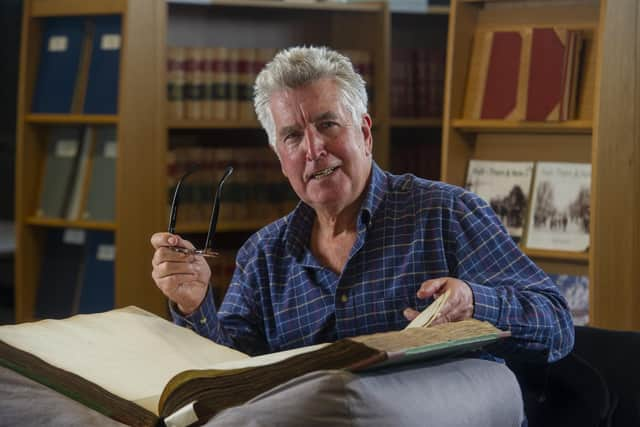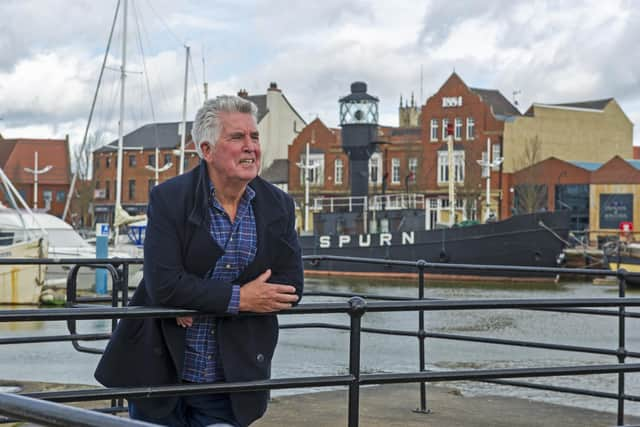Hull historian Robb Robinson on why Yorkshire Coast fishermen must be remembered for First World War efforts
Dr Robinson, of the Blaydes Maritime Centre at the University of Hull, has contributed a chapter all about this subject in a recently released book, The British Home Front and the First World War, edited by Sir Hew Strachan and published by Cambridge University Press.
It highlights how important of the home front was during a war which for most people, understandably, more often evokes images of heroic young men fighting in trenches across fields in France.
Advertisement
Hide AdAdvertisement
Hide AdBut that is far from the only story. The book was developed as part of commemorations for the centenary of the war, 100 years on from the conflict of 1914 to 1918.


What emerged, says Dr Robinson, was that “perhaps everybody knew a great deal about the Great War in terms of Western Front, the trenches, you know, some of the theatre of war such as Gallipoli, Battle of Jutland, that sort of thing.
“But a lot of people didn't appreciate or realise, of course, nowadays, the extent that the war had impinged on everybody's life. This was arguably the first total war in the sense that it covered much of the globe, and that any state that was involved had to mobilise all its economic and social resources to win the war.
"Everybody was engaged, or most people in the population were engaged, in one way or the other.”
Advertisement
Hide AdAdvertisement
Hide AdDr Robinson’s colleagues from the University of Hull, Dr Martin Wilcox and Professor David J Starkey have also contributed a chapter called Seaborne Trade and Merchant Shipping.


“I come from a fishing family, and one of the things that was quite clear to me very early on is that the range and contribution that the fishing industry made to the war has largely been forgotten or neglected in the modern story that we tell up off the Great War,” says Dr Robinson, who is in his early 70s.
"Fishermen and the fishing industry were involved in several ways. They were involved in taking the war to the enemy vessel. Fishing vessels were used for mine sweeping and anti-submarine duties, you know, trawlers or drifters were used for that, along with their crews.
"But equally, those vessels that remained had to more than make up for the losses of the other vessels to the war effort because they needed to maintain the beleaguered nation's food supply, and fish supply, contribute to that. So they played a very crucial role across there and that was large fishing vessels operating out places such as Hull, Grimsby, Scarborough, Aberdeen, and the like, but also equally small vessels working from tiny ports in places such as Flamborough, Robin Hood's Bay, Staithes, and much further afield, off the coast of Ireland or off the coast of Wales.”
Advertisement
Hide AdAdvertisement
Hide AdDr Robinson’s own grandfather, George Robinson, for one, fought in the war as a minesweeper (and ancestors in the 19th century even went whaling).
But even those who continued to keep up their normal trade during the conflict found themselves under threat from the enemy.
“They were fishermen pursuing a civilian occupation, i.e. catching fish, (but) were actually doing it on the frontline of a maritime conflict.
"After about less than a year, they became themselves a target of enemy action, because the enemy were quite clear that they wanted to deny these vessels to Britain or deny the food supply to Britain.
Advertisement
Hide AdAdvertisement
Hide Ad"So quite a large number of these vessels were targeted and sunk. Quite often the crews survived because they were allowed to row away in their rowing boat. But nevertheless, the vessels were lost and the crews faced hazardous journeys across the North Sea and other waters in an open boat.”
He adds: “Inevitably fishermen, pursuing civilian duties, became casualties of war. And quite a number lost their lives or they were captured and then interned. Fishermen did contribute quite enormously. Certainly, after the war, the fishery board claimed that more people from the fishing industry were engaged in different aspects of the war than any other occupation. I'm not sure that that's definitely the case, but certainly they played a very crucial role because they had a skill, you know, seafaring skills, and fish catching skills, that were very essential, given the climate and operation of the war.”
Hull and the Yorkshire Coast were also heavily involved through the Merchant Navy – then known as Mercantile Marines – which were targeted by U-boats, says the Hull historian.
Dr Robinson, who has lectured on cruise ships cross much of the globe, says: “I like to think it would be a book that will be of great use to historians and lay people in the future when they're trying to understand the nature of the war because although the war was over 100 years ago, for the people who were writing this book, in a sense, it's not quite that far away is it? Because almost everybody today, even though it was over 100 years ago, know somebody or or know somebody who knew somebody who was engaged in some aspect of the Great War.”
The British Home Front and the First World War can be ordered online. ISBN: 9781009025874.